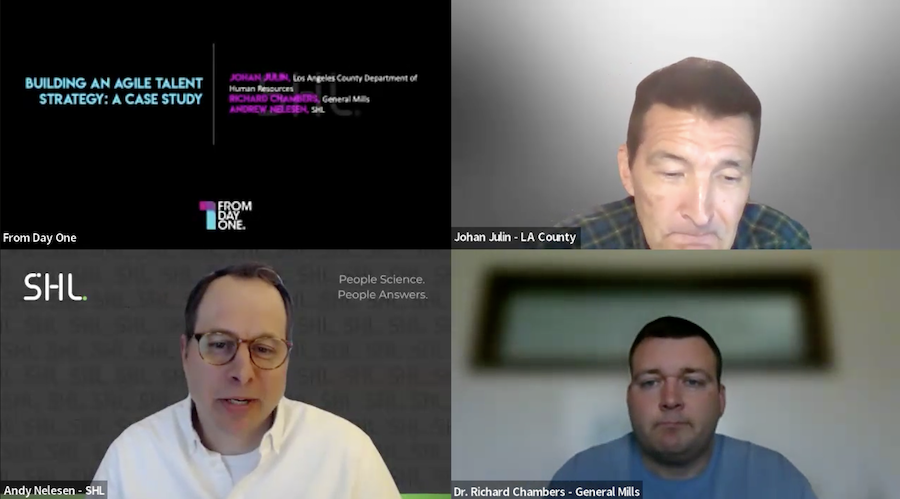Building an Agile Talent Strategy: A Case Study


A single mom applying for a clerical job may not have the amount of work experience as other applicants. But as Johan Julin, senior manager of talent assessment at the Los Angeles County Department of Human Resources says, by not looking at the single mom’s life experience as a valuable asset, they’d be missing out.
“This person probably had to multitask quite a bit. They had to manage multiple priorities, budget, children, and time,” Julin said. The candidate could have been an agile hire who would not only be able to fill the immediate role, but also overcome changes and uncertainty.
Julin weighed in on this important topic at From Day One’s webinar about “Building an Effective Talent Strategy for the Skills of the Future.”
Leveraging Skills-Based Assessments
Filling the roles of the largest municipality in the country is no small task. Los Angeles County employs an impressive 115,000 people, in jobs as diverse as tax collectors, librarians, garbage collectors, lifeguards, and coroners.
Due to the sheer volume and regulations surrounding the government positions, Julin says that right now, from the day someone applies until their first day on the job is close to 290 days. “It is my job to bring that number down,” he said.
One major aid in accomplishing that is technology. Specifically, better leveraging skills-based assessments, which they’ve used in some variation for years, but are underutilized and could be the key to unlocking an agile talent force. Technology that could help organizations better review job applications, like that single mother who applied for a clerical position.
In conjunction with talent management company SHL, LA County recently developed an assessment that uses a candidate's lived experience to assess their suitability for various job roles. “I can't even tell you how excited I am about this,” Julin said.
Going back to the single mom example, without the traditional experience on her application, she’d likely be passed over. But with this assessment that values real-life skills, their talent pool has not only increased, but includes outside-the-box thinkers who may be more empathetic.
“This assessment does that for us. It evaluates those kinds of experiences and gives them points for it, so that they’re on a level playing field with everyone else. And the best thing of all, it can be administered in five to ten minutes, which has my hiring managers jumping up and down with joy.”

Andrew Nelesen, global solutions director at SHL, moderated the webinar, and spoke about a recent study they conducted of tens of thousands of participants who completed an assessment with the resulting data on 96 soft skills.
“We did this massive correlation to figure out what combination of these 96 skills tend to be predictive of success across different job contexts,” he said. Ultimately, employees with a growth mindset are most successful, regardless of role or level, he says.
It’s all great stuff. What Julin envisions, however, brings in all the assessment results into one big skills database that could help talent at Los Angeles be more agile.
“Let’s say there’s a disaster in some part of LA County, and we urgently need people to, I don't know, say, speak Armenian. If we have a consolidated database of skills, we could instantly call up a list of people who fit that bill.”
Start Where You Are
Richard Chambers, manager of global supply chain talent management and enterprise performance management at General Mills, also spoke in the webinar. He leads the company’s global assessment practice for a talent base of 30,000.
One thing he stressed was no matter how big or small the organization, building agile talent can be intimidating. How do you even start? What’s the best way to approach it? The important thing is to just start. Do those best practices and make hiring a good experience. Gather data along the way, he says.
“We’re going to test and learn. And we’re probably going to change our strategies and approach a few times along the way, because the world around us is changing, and what we learn is going to continue to change.”
Chambers says companies should model the agile behavior they’re hoping to see in their talent. They start with the pre-hire side, improving the applicant experience, assessing skills, developing a conversation from the start.
“This ties into one of our bigger goals as an organization, which is really around careers.” In the wake of the Great Resignation in the general workforce, Chambers says they want to help new hires look at work differently. “We want people to be able to feel like they can have a robust career at General Mills and stay with us as long as they want.” That includes development opportunities, showing employees assessment data so they can see opportunities for personal growth, but also transferable skills for different positions within the company.
The skills they value? Resilience, adaptability, natural inquisitiveness. The world is only going to continue to change, and people need to change with it. Those are the kind of people that are agile. He added that assessments are great equalizers, as they look at the skills rather than the degrees, and from a diversity and inclusion perspective, it gives talent power.
One of the biggest challenges in using assessments to build agile talent is trust. Recently, Chambers launched an internal assessment. Some employees wonder, how will this data be used?
“We’re always transparent about how we’re going to use your data,” he added. “It’s truly intended for development purposes.” Organizations must build trust and show employees that they want not only the best for the company, but for the talent.
Editor's note: From Day One thanks our partner, SHL, for sponsoring this webinar.
Carrie Snider is a Phoenix-based journalist and marketing copywriter.
The From Day One Newsletter is a monthly roundup of articles, features, and editorials on innovative ways for companies to forge stronger relationships with their employees, customers, and communities.